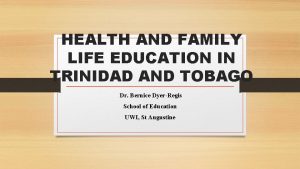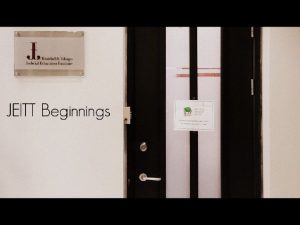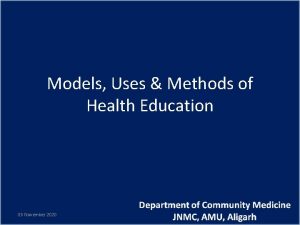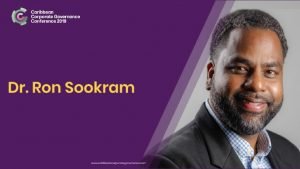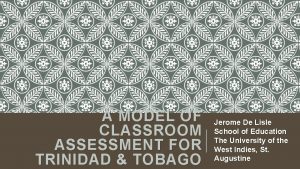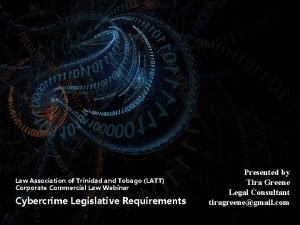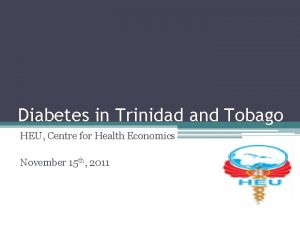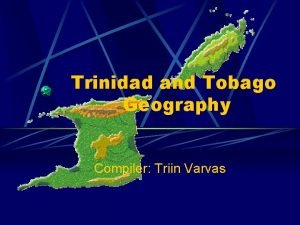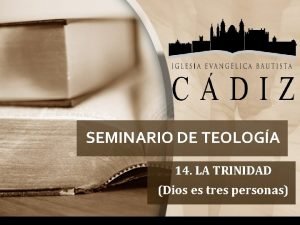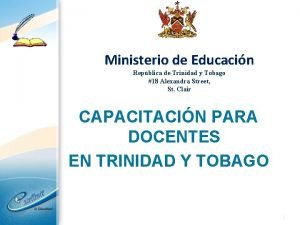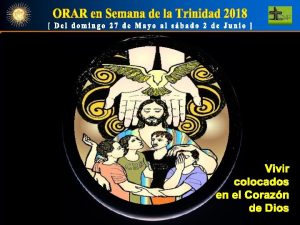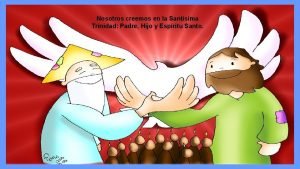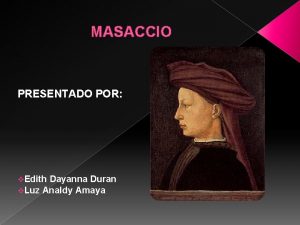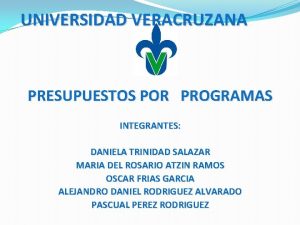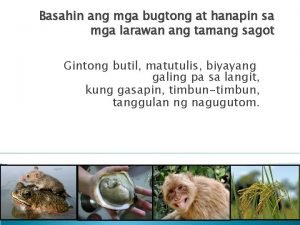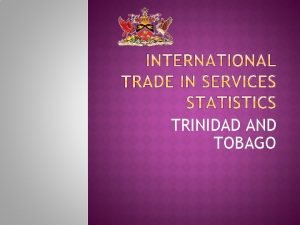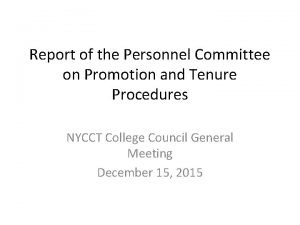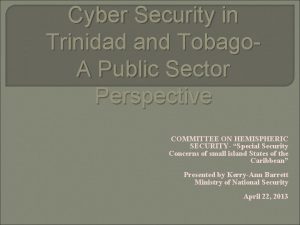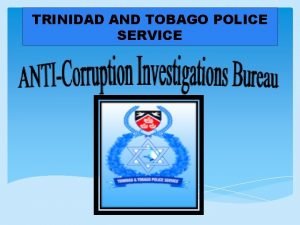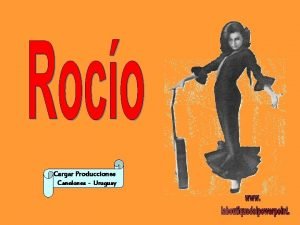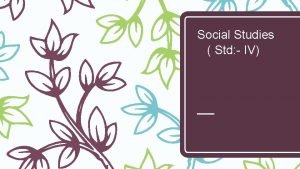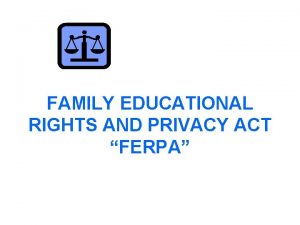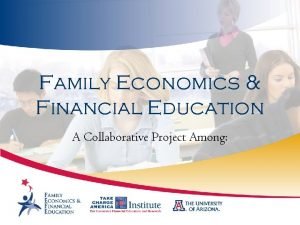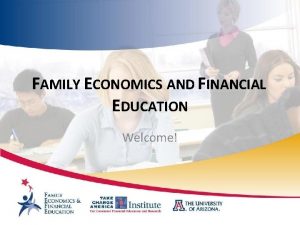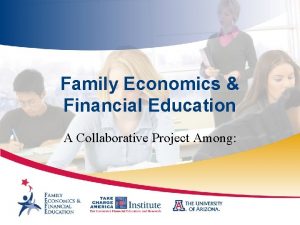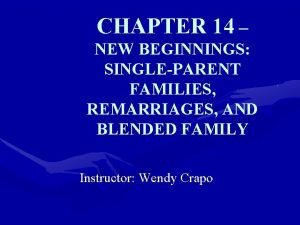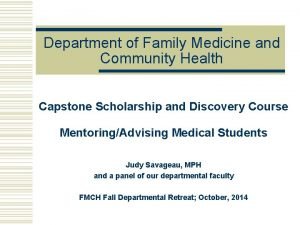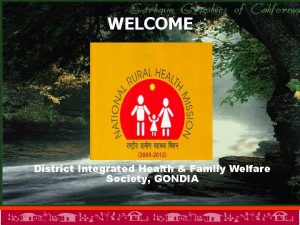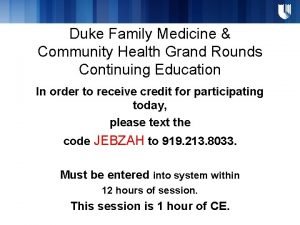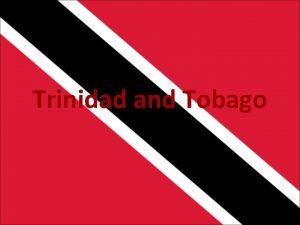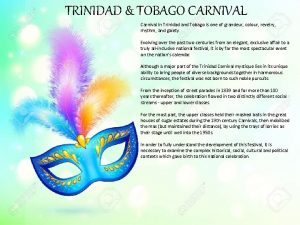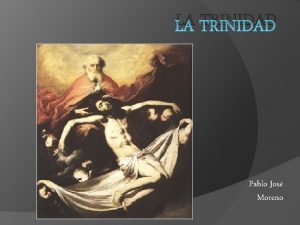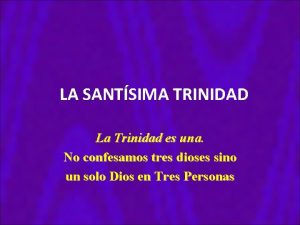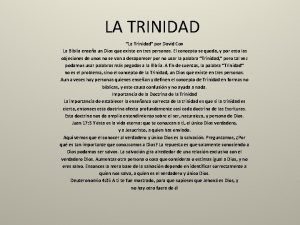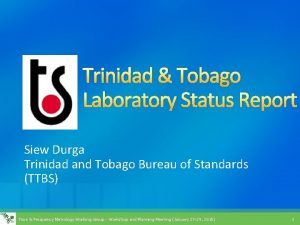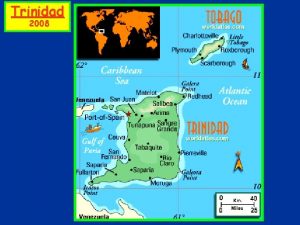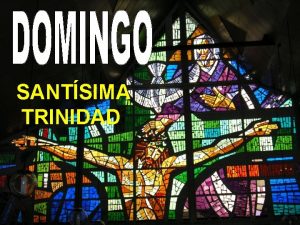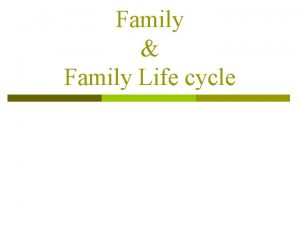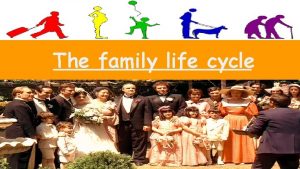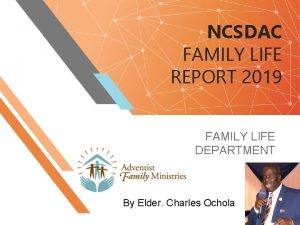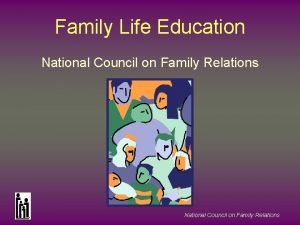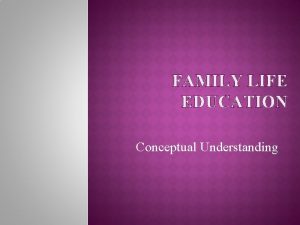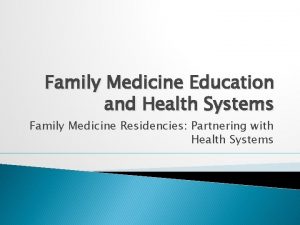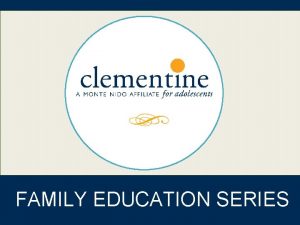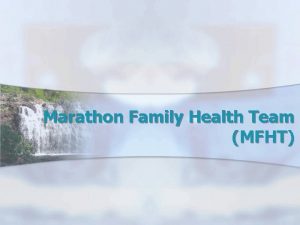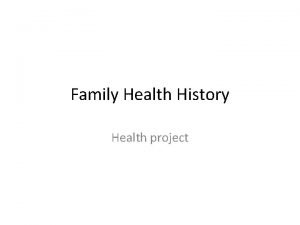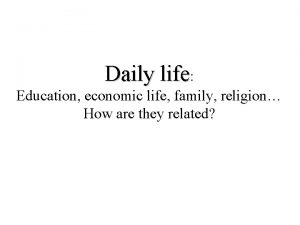HEALTH AND FAMILY LIFE EDUCATION IN TRINIDAD AND





































- Slides: 37

HEALTH AND FAMILY LIFE EDUCATION IN TRINIDAD AND TOBAGO Dr. Bernice Dyer-Regis School of Education UWI, St Augustine

NATIONAL HEALTH SITUATION • Leading causes of morbidity and mortality in Trinidad and Tobago caused by individuals’ health behaviour and lifestyles • Lifestyles are established early in life; hence it is crucial to address the issues of health early in life • Unhealthy behaviours as diets high in fat, salt, cholesterol and sugar; tobacco use; and excessive alcohol consumption contribute to non-communicable diseases like diabetes, hypertension, heart diseases and cancers that are responsible for 60% of all deaths Ministry of Health (2011) Health Record Card for Trinidad and Tobago 2011 http: //www. health. gov. tt/downloads/Download. Details. aspx? id=223

MEDIA REPORTS/SOCIAL MEDIA ANECDOTES • • Bullying Inappropriate sexual behavior Substance abuse Gruesome homicides Domestic Violence Sexual harassment Motor Vehicle Accidents

YOUTH HEALTH The Trinidad and Tobago Global School Health Survey (2001) http: //www. paho. org/trt/index. php? option=com_content&view=article&id=168: global-school-health-surveys-report-andfact-sheets-&Itemid=197 School-based survey of students in Forms 1 -4 • Among students who ever had a drink of alcohol (other than a few sips), 86. 5% had their first drink of alcohol before age 14 years • 26. 2 % of students were overweight

YOUTH HEALTH cont’d • 74. 6 % of students usually drank carbonated soft drinks one or more times per day during the past 30 days • Among students who ever used drugs, 77. 2% first used drugs before age 14 years • 17 % students seriously considered attempting suicide during the past 12 months while 14. 4% actually attempted suicide one or more times during the past 12 months • Only 29. 2% of students were physically active for a total of at least 60 minutes per day on five or more days during the past seven days

YOUTH HEALTH cont’d • 27. 1% of students ever had sexual intercourse. Among those, 62. 2 % had sexual intercourse for the first time before age 14 years • 10% of students smoked cigarettes on one or more days during the past 30 days. Among students who ever smoked cigarettes, 83. 9 % first tried a cigarette before age 14 years • 35. 9 % of students were in a physical fight one or more times during the past 12 months • 15. 4% were bullied on one or more days during the past 30 days

YOUTH HEALTH cont’d Caribbean Food and Nutrition Institute (2010) Interim Report on the findings of the evaluation of School Meal Options in Trinidad and Tobago. Dietary intake of Form 3 students • 23% of primary school children in Trinidad and Tobago were overweight/obese • 25% of secondary school aged children were overweight/obese • Most common types of food consumed were high in fat, salt, sugar and other simple carbohydrates while fibre intake was generally very low

YOUTH HEALTH cont’d 2009 cross-sectional survey • 67, 000 primary and secondary school children (5 -17 years) to determine urine glucose. • Survey results revealed prevalence of Type 2 diabetes to be 10. 4 per 100, 000 students; pre-diabetes was 7. 5 per 100, 000 while Type 1 diabetes was 1. 5 per 100, 000 children. Helen Bhagwansingh Grant to the The University of the West Indies (2011) Diabetic Study Report –DERPI Campus News January 17 http: //sta. uwi. edu/news/release. asp? id=752

THE ROLE OF SCHOOLS • Strategic point of entry for improving children’s health, self-esteem, life skills and behaviour. • Education for prevention is more effective if it starts before the onset of risk behaviours. • Schools are seen as powerful agents in the promotion of good health among students through the curriculum and everyday practices • Schools reach a larger population (captive audience) for many years.

HFLE - HISTORY • The subject area was first introduced in 1988 as “Family Life Education” for use in Primary schools. • Curriculum content and objectives were organized into four broad areas • • Health and Well being Family Population Education Work / leisure Did not have the desired result.

HFLE – HISTORY cont’d • 1994 - Trinidad and Tobago’s participation in the CARICOM Multi. Agency Health and Family Life Education Project. • 1996 - The decision to review, revise and re-design the Primary Health and Family Life Education (H. F. L. E. ) Curriculum had its genesis in the Agreement signed by the CARICOM Standing Committee of Ministers of Education and Health. • This agreement gave birth to the UNICEF-led CARICOM Multiagency H. F. L. E. Project.

HFLE DEVELOPMENT PHASES • This UNICEF led initiative was designed to reach completion through three distinct phases: - • Phase I - Development of national H. F. L. E. policies. • Phase II - Development of country H. F. L. E. curricula. • Phase III - Training of teachers and production of resource materials.

PHASE I - DEVELOPMENT OF NATIONAL HFLE POLICY • By Cabinet Minute No. 1401 -2001/16/03 the Government of Trinidad and Tobago approved the National H. F. L. E. Policy. This document was produced by an interim National H. F. L. E. Committee which included: - • The Curriculum Officer responsible for H. F. L. E • UNICEF appointed consultant

PHASE I - DEVELOPMENT OF NATIONAL HFLE POLICY cont’d National H. F. L. E. Committee cont’d • Representatives of the: - • Ministry of Education. • Ministry of Health. • Pan American Health Organisation (P. A. H. O. ). • Family Planning Association (F. P. A. ). • National Parent Teachers Association (N. P. T. A. ). • University of the West Indies (U. W. I. ). • Trinidad and Tobago Unified Teachers Association (TTUTA). • Inter-Religious Organization.

PHASE II - DEVELOPMENT OF COUNTRY HFLE CURRICULA • 2006 : The Curriculum Development Division of the Ministry of Education, GORTT, produced the Health and Family Life Curriculum for Primary Schools • Focuses on the development of Life Skills for psycho-social competence • Overarching theme of Health and Wellness

PHASE II - DEVELOPMENT OF COUNTRY HFLE CURRICULA cont’d Under the overarching theme of Health and Wellness, the document targets issues related to four (4) thematic areas as mandated by UNICEF in conjunction with the CARICOM Secretariat: • • Self and Interpersonal Relationships Sexuality and Sexual Health Eating and Fitness Managing the Environment

PHASE II - DEVELOPMENT OF COUNTRY HFLE CURRICULA cont’d The Curriculum Guide is laid out in three (3) parts: • Curriculum Foundations • Curriculum Content • Course Outlines

HFLE SECONDARY SCHOOL CURRICULUM • 2009 • Curriculum Planning and Development Division, Ministry of Education • Forms 1– 3 Health and Family Life Education • http: //www. ibe. unesco. org/curricula/trinidadtobago/tr_ls_lf_2009_en g. pdf

HFLE CURRICULUM FRAMEWORK THEMES The four thematic areas are as follows: • • Self and Interpersonal Relationships Sexuality and Sexual Health Appropriate Eating and Fitness Managing the Environment

HFLE CURRICULUM FRAMEWORK THEMES cont’d • The four (4) themes will allow teachers to target the overarching theme which is Health and Wellness. • The new thematic approach marks a departure from the traditional topic centered organization of curricula. • For example, the use of alcohol and drugs, as well as premature sexual activity, represent maladaptive responses to coping with poor self-worth, boredom, failure, isolation, hopelessness, and fragmented relationships.

NATURE AND SCOPE OF HFLE • Unlike the old Curriculum which was biased toward the acquisition of knowledge, the new document focuses on the development of Life Skills for psycho-social competence • Psychosocial competence is a person’s ability to deal effectively with the demands and challenges of everyday life • HFLE promotes psychosocial competence in children and youth, by teaching them life skills which are abilities for adaptive and positive behaviour

WHAT ARE LIFE SKILLS? • Life Skills are those learned abilities which enable the individual to “live” successfully. • These are the abilities needed by a person to live in the society as a well-integrated and productive individual • HFLE is therefore a SKILLS BASED subject area. The focus is therefore on the skill and the content is used to develop the skill being addressed

HFLE LIFE SKILLS • Decision-making e. g truancy • Problem-solving e. g without resorting to violence • Creative thinking • Effective communication • Interpersonal skills • • • Self-awareness Empathy Negotiation skills Refusal skills Assertiveness skills

HFLE TEACHER TRAINING • The country is lagging behind its Caribbean neighbours in the area of implementation • A concerted effort at HFLE Teacher Training is yet to be seen at the national level • Curriculum Officers were trained in the infusion of HFLE in the different subject areas - there used to be field work for teachers on the infusion of HFLE into their subjects

HFLE TEACHER TRAINING cont’d • Students enrolled in the Masters of Education (Youth Guidance) are exposed to a one semester course in HFLE • Dip. Ed and B. Ed programs have an HFLE sensitization component • Teachers trained on how to use participatory methodology(focus on skills competency) to teach HFLE at their schools

HFLE TEACHER TRAINING cont’d Research Projects undertaken by some postgraduate students of the School of Education of the University of the West Indies, reveal the following: • HFLE is not universally implemented • HFLE is implemented in some classes in few schools where the Principals or teachers have a special interest in the subject • Generally, teachers have indicated that they lack the required knowledge or skills to teach theme sexuality and sexual health. • HFLE is being implemented haphazardly

CURRICULUM GUIDE The Health and Family Life Education Curriculum for Secondary Schools • Theme: Self and Interpersonal Relationships • Form 1 — Term 1 • Content Standard - Students will gain the knowledge necessary to understand accept themselves as unique individuals within the social environment, become aware of the changes and challenges faced by individuals as they go through life, and acquire the positive life skills necessary for being good citizens. This unit is intended to assist students in understanding themselves as individuals. It also explores the various changes they experience as they mature.

CURRICULUM GUIDE CONT’D Performance Standards Using the knowledge gained from the content used, students will demonstrate improved abilities to manipulate their environment so as to improve their ability to fit seamlessly into the social environment when they graduate from school. They shall demonstrate this ability by: • Discovering, understanding and articulating to others their image of self • Developing positive relationships • Demonstrating respect for self and others

CURRICULUM GUIDE CONT’D Performance Standards Cont’d • • Showing concern for the safety of self and others Applying non-violent solutions to conflict situations Demonstrating coping ability to deal with criticism Demonstrating practical, non-confrontational ways of saying “NO”

CURRICULUM GUIDE CONT’D • Topic: SELF IMAGE AND SELF IMPROVEMENT • Sub-topic: Exploring Dimensions of Self / Learning to Manage Emotions / The Communication Process • Self esteem and body image - Life skills targeted e. g self acceptance - Suggested teaching / learning Strategies e. g simulation - Resources e. g scenarios/stories - Related values and attitudes e. g self awareness

CURRICULUM GUIDE CONT’D • Topic: SELF IMAGE AND SELF IMPROVEMENT (cont’d) • Sub-topic: Exploring Dimensions of Self / Learning to Manage Emotions / The Communication Process (cont’d) • Self esteem and body image (cont’d) - Specific learning outcomes e. g identify qualities that they most admire about themselves. - Suggested assessment/ evaluation - compare character sketches of self ‘now’ and in the ‘future’

RECOMMENDATIONS • Improve teacher training in participatory methodologies specific to Health and Family Life Education • HFLE should be fully implemented at the Primary and Secondary Levels

READINGS • UNICEF (2010) Health and Family Life Education Regional Curriculum Framework –Ages 5 years-12 years, Version 2. 1 http: //www. unicef. org/easterncaribbean/UNICEF_HFLE_Ages_5 -12. pdf • Forms 1– 3 Health and Family Life Education http: //www. ibe. unesco. org/curricula/trinidadtobago/tr_ls_lf_2009_e ng. pdf

READINGS CONT’D • Ministry of Health (2011) Health Record Card for Trinidad and Tobago 2011 http: //www. health. gov. tt/downloads/Download. Details. aspx? id=223 • Ministry of Health (2012) CNCD Risk Factor Survey Final Report http: //www. health. gov. tt/newsitem. aspx? id=394 • World Health Organization (2011) Global School-based Student Health Survey Trinidad and Tobago 2011 Fact Sheet http: //www. who. int/chp/gshs/2011_factsheet_trinidad_and_tobago. pdf

READINGS CONT’D • Caribbean Food and Nutrition Institute (2010) Interim Report on the findings of the evaluation of School Meal Options in Trinidad and Tobago. • World Health Organization (1996) The WHO Expert Committee on Comprehensive School Health Education and Promotion http: //www. who. int/school_youth_health/media/en/87. pdf? ua=1

READINGS CONT’D • Naidoo, J. & Wills, J. (2011). Foundations for Health Promotion (3 rd ed. ). China: Elsevier. • Mangrulkar, L. , Vince Whitman, C. , & Posner, M. (2001) Life skills approach to child and adolescent healthy human development. Washington, DC: Pan American Health Organization. http: //hhd. org/resources/research/life-skills-approach-child-andadolescent-healthy-human- development

THE END THANK YOU
 Hfle curriculum
Hfle curriculum Judicial education institute of trinidad and tobago
Judicial education institute of trinidad and tobago Distinguish between education and health services
Distinguish between education and health services Difference between health education and propaganda
Difference between health education and propaganda Public companies in trinidad and tobago
Public companies in trinidad and tobago Fpsi model
Fpsi model Law association of trinidad and tobago
Law association of trinidad and tobago Diabetes in trinidad and tobago
Diabetes in trinidad and tobago Cheap high security fence
Cheap high security fence Trinidad geography
Trinidad geography Trinidad biblica
Trinidad biblica Educacion en trinidad y tobago
Educacion en trinidad y tobago Trinidad de dios
Trinidad de dios Pincha comandas
Pincha comandas Edith v duran
Edith v duran Chemineer mixers trinidad
Chemineer mixers trinidad La trinidad de andrei rublev
La trinidad de andrei rublev Daniela trinidad
Daniela trinidad Bugtong tungkol sa niyog
Bugtong tungkol sa niyog Central statistical office trinidad
Central statistical office trinidad Lieselle trinidad
Lieselle trinidad Masaccio pinturas
Masaccio pinturas Trinidad. maldonadd
Trinidad. maldonadd Denovo trinidad
Denovo trinidad Cybercrime unit trinidad
Cybercrime unit trinidad Lectio divina santisima trinidad ciclo b
Lectio divina santisima trinidad ciclo b Trinidad corruption
Trinidad corruption María del rocío trinidad mohedano jurado
María del rocío trinidad mohedano jurado Conclusion on topic family
Conclusion on topic family Ferpa
Ferpa Fefe curriculum
Fefe curriculum Version 9
Version 9 Fefe curriculum
Fefe curriculum Periodic table families
Periodic table families Blended family vs binuclear
Blended family vs binuclear Family and community health advisor
Family and community health advisor District integrated health and family welfare society
District integrated health and family welfare society Duke family medicine and community health
Duke family medicine and community health
